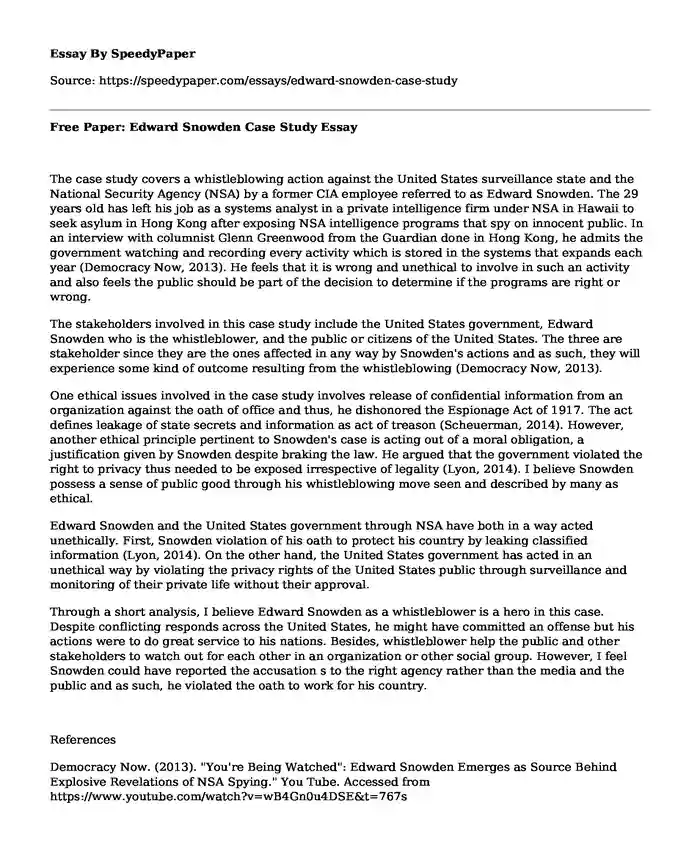
| Type of paper: | Case study |
| Categories: | Intelligence services |
| Pages: | 2 |
| Wordcount: | 526 words |
The case study covers a whistleblowing action against the United States surveillance state and the National Security Agency (NSA) by a former CIA employee referred to as Edward Snowden. The 29 years old has left his job as a systems analyst in a private intelligence firm under NSA in Hawaii to seek asylum in Hong Kong after exposing NSA intelligence programs that spy on innocent public. In an interview with columnist Glenn Greenwood from the Guardian done in Hong Kong, he admits the government watching and recording every activity which is stored in the systems that expands each year (Democracy Now, 2013). He feels that it is wrong and unethical to involve in such an activity and also feels the public should be part of the decision to determine if the programs are right or wrong.
The stakeholders involved in this case study include the United States government, Edward Snowden who is the whistleblower, and the public or citizens of the United States. The three are stakeholder since they are the ones affected in any way by Snowden's actions and as such, they will experience some kind of outcome resulting from the whistleblowing (Democracy Now, 2013).
One ethical issues involved in the case study involves release of confidential information from an organization against the oath of office and thus, he dishonored the Espionage Act of 1917. The act defines leakage of state secrets and information as act of treason (Scheuerman, 2014). However, another ethical principle pertinent to Snowden's case is acting out of a moral obligation, a justification given by Snowden despite braking the law. He argued that the government violated the right to privacy thus needed to be exposed irrespective of legality (Lyon, 2014). I believe Snowden possess a sense of public good through his whistleblowing move seen and described by many as ethical.
Edward Snowden and the United States government through NSA have both in a way acted unethically. First, Snowden violation of his oath to protect his country by leaking classified information (Lyon, 2014). On the other hand, the United States government has acted in an unethical way by violating the privacy rights of the United States public through surveillance and monitoring of their private life without their approval.
Through a short analysis, I believe Edward Snowden as a whistleblower is a hero in this case. Despite conflicting responds across the United States, he might have committed an offense but his actions were to do great service to his nations. Besides, whistleblower help the public and other stakeholders to watch out for each other in an organization or other social group. However, I feel Snowden could have reported the accusation s to the right agency rather than the media and the public and as such, he violated the oath to work for his country.
References
Democracy Now. (2013). "You're Being Watched": Edward Snowden Emerges as Source Behind Explosive Revelations of NSA Spying." You Tube. Accessed from https://www.youtube.com/watch?v=wB4Gn0u4DSE&t=767s
Lyon, D. (2014). Surveillance, Snowden, and big data: Capacities, consequences, critique. Big Data & Society, 1(2), 2053951714541861.
Scheuerman, W. E. (2014). Whistleblowing as civil disobedience: The case of Edward Snowden. Philosophy & Social Criticism, 40(7), 609-628.
Cite this page
Free Paper: Edward Snowden Case Study. (2022, Jun 27). Retrieved from https://speedypaper.net/essays/edward-snowden-case-study
Request Removal
If you are the original author of this essay and no longer wish to have it published on the SpeedyPaper website, please click below to request its removal:
- Essay Sample Describing History and Background of Ang Lee
- Use of ICT and Technology in Schools: Free Essay in Education and Technology
- Essay Example on Website Security and Vulnerability Assessment
- Free Essay on Six Sigma Key Elements
- Essay Sample Analyzing the Positive Effects of Technology
- Essay Example on the Impact of Faith on Profession
- Advocacy Journalism Essay Example
Popular categories




